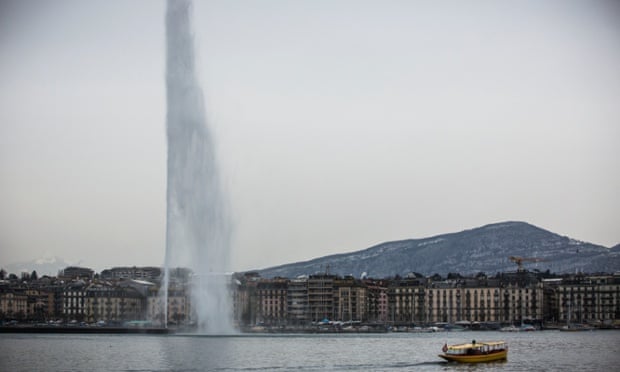Part 2: Cache of leaked data show how throughout 2005, scores of account holders arrived in Geneva, often emerging with currency foreign to Switzerland

Not far from the Jet d’Eau, the famous Lake Geneva fountain, a huge rooftop sign proudly declared: “HSBC Private Bank”. Money didn’t just talk here: it shouted. But the actual facts of what went on inside No 2, Rue Dr-Alfred-Vincent were less well publicised. Through its revolving doors, a stream of visitors slipped in and then out again with packets of cash in untraceable banknotes.
From information contained in leaked files from HSBC’s Swiss subsidiary, the Guardian has been able to reconstruct a diary of a year in the life of HSBC’s cash machine. Large cash transactions are a classic warning sign to bankers. But instead of blocking the withdrawals or even interrogating them, the bank repeatedly handed out packets of untraceable banknotes.

Specialist UK tax barrister Jolyon Maugham says: “Why on earth would you travel to Switzerland to take out sterling in cash? Why would you not just ask the Swiss branch to wire the money to your bank account in the UK? I struggle to see an answer to that question that doesn’t involve you wanting to obscure from the UK tax authorities the fact that you have money in a Swiss bank account.”
Only when these facts later leaked out did the bank reform. It says it now seeks tooperate “strict controls” on withdrawals of more than £6,600.
Day by day, throughout 2005, a succession of holders of numbered accountsarrived, from the UK, France, Germany, Scandinavia, the US, Italy, Spain, Belgium and the Netherlands. They often emerged with currency of little use in Switzerland itself. These British pounds, euros, US dollars, even Danish krone, were for spending at home, or sometimes to buy villas and flats abroad.
Some clients have been frank that they were dodging tax. Retired accountant Andrew Sebastian, who collected a total of £50,000 cash that year, said that since the HSBC data leaked out, he had settled with HMRC for a payment of £42,722.
A British antiques dealer, Caroline Carrier, picked up £12,000 cash in April and another £12,000 in August. She told the Guardian the matter had been “settled legally” in 2010, and HMRC had now collected all the taxes due on her inherited account.
Others have denied wrongdoing or offered no explanation for their withdrawals when contacted by the Guardian. In the absence of any explanation, it is not possible to assess whether the withdrawals were for legitimate purposes.
Arlette Ricci, the Nina Ricci perfume heiress, had the equivalent of £15m in Swiss accounts. The bank provided her with 10 packets of €7,500 each throughout 2005, totalling about £60,000. She denies all wrongdoing.
Jewellery trader Harry Fane, younger son of the Earl of Westmorland, who had a total of up to £700,000 in HSBCSwiss accounts, confided to the bank that he wanted large sums of cash “to fund ongoing building work on his property in London”. His lawyer told the Guardian his financial affairs were private, had been conducted entirely lawfully, the accounts were now closed and no tax was outstanding on them.
Hanne Tox, the widow of a Danish industrialist, did not respond to invitations to comment. She took away a total of 200,000 krone (about £21,000), from a £1.25m offshore trust account. According to the files, HSBC noted that all contact must go via a relative in London, “critical, as it is a criminal act having an account abroad non-declared”.
Another Dane who collected cash in Switzerland was meat trader Torben Lenzberg. Lenzberg’s Danish phone number on the bank file is marked “DO NOT CONTACT!” This again could suggest the bank was aware of a clash with Danish law. HSBC says it has since banned its Swiss “hold mail service” under which it kept all correspondence and made no giveaway phone calls. Lenzberg has not commented.
Another Briton, recorded as having a £2m share in an inherited trust fund, went half a dozen times to the bank’s Zurich branch. She collected £70,000 over the year, insisting she wanted British low-denomination “used notes”.
With untraceable cash, tax returns become voluntary. Former tax inspector Richard Brooks told the Guardian: “If you withdraw cash from a bank in Geneva or Zurich, there’s no trail of that over here. Most rich individuals will get their accountants to fill in their tax returns. They’ll be working from their banking records. But there’s nothing for your accountant to see.”
One particularly large handover by the bank of $100,000 (£66,000) to Swiss tax-resident diamond trader Beny Steinmetz was accompanied by an innocent explanation. He told the bank it was for travel expenses and fuel for trips to South Africa and Russia. (He says he fully complied with all applicable laws).
Eufemiano Fuentes, a Spanish doctor, later to be convicted of sports doping, whose offshore funds came from illegal doping of racing cyclists, withdrew a total of €265,000 in cash in the course of the year, claiming it was to buy a boat and to pay hospital bills for his daughter.
More normal withdrawals were equivalent to £10,000 to £20,000 a time. The UK cash pilgrims also included property traders, a diet clinic owner and a toy manufacturer. In one ingenious racket, HSBC manager Nessim Elmaleh pleaded guilty in 2013 to a deft laundering operation in which wealthy HSBC clients in Paris would get untraceable cash generated from the proceeds of big drug deals in the city. Elmaleh would reconcile the payments by transferring funds from the clients’ accounts to those of the drug kingpins.
The files show the bank reassuring another Briton who collected £30,000 in cash “in a hurry”, HSBC noted. “He was under the impression that the Swiss banking secrecy was being lifted and the family are therefore trying to remove their assets. I informed them that this was not the case and that they had no need to reduce their account so quickly.”
The British owner of a furniture store in central London made clear his unlawful intentions. According to the leaked files, he said: “What is the point of having money ‘offshore’ if one cannot have access to it?”
The bank said he wanted “to have someone who would bring cash to him in the UK. He is not interested in the service that we could possibly provide him at HSBC Premier in Knightsbridge, as he would have to identify himself by passport! He said, ‘I do know banks in your part of the world who are able to provide this service, using … their representative in Panama to bring in cash.’”
But HSBC managers refused to courier such cash themselves across borders. They told him instead that they were prepared to offer “passive”, but not “active” assistance.

Despite its self-protective caution, HSBC does however appear to have tipped its customers off to behaviour that might alert the taxman. In another case, a banker said two clients “asked about taking cash into the UK. I told them that the ‘limit’ was £10,000 – information obtained from HSBC Compliance in London who had spoken to HM Customs in 2003… If a person with funds in excess of £10,000 is stopped by HM Customs he had better have the right answers.”
The evidence of a pattern of misconduct is supported by the outcome of court cases in the US and Europe. Months before the IRS formally received the leaked HSBC Swiss data, US surgeon Andrew Silva admitted in 2010 that HSBC’s Swiss bank deliberately gave him “bricks” of $100,000 in notes, to secretly post home in a series of envelopes. According to court papers, the bank told its client not to wire money because that would “create a trail for US authorities”. In a 2013 US prosecution, Vaibhav Dahake, a New Jersey businessman, similarly admitted HSBC bankers warned him not to carry in more than $10,000 in illegal funds, but to “stay below the radar”.
US attorney Paul Fishman said at the time: “Bankers should encourage their clients to comply with the law, not advise them how to break it.”




























